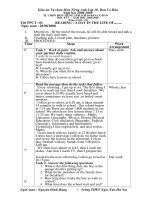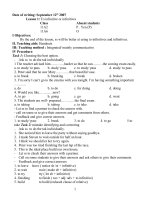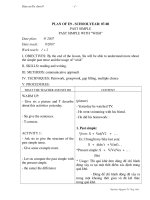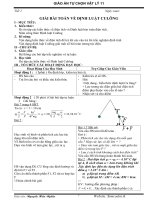giao an tu chon TA 11 (cuc xin)
Bạn đang xem bản rút gọn của tài liệu. Xem và tải ngay bản đầy đủ của tài liệu tại đây (456.86 KB, 32 trang )
Giáo án tự chọn Môn Tiếng Anh - Lớp 11- Ban cơ bản
Năm học 2008-2009
Tiết PPCT: 01 Reading and Speaking
FRIENDSHIP
Ngày soạn : 26 /08/ 2008
I. Obbjectives : By the end of the lesson Ss will be able to :
II. Teaching Aids : lesson plan , handout , pictures
III. Procedure :
Time Steps
Work
Arrangemen
Warm up & Before you read
T asks Ss to giv some words related to friendship
WHILE YOU READ
Read the texts and do the tasks that follow:
A. Joan is an American eleventh grader. The following are
his opinions on friendship during his school years
- In 8
th
grade, your idea of a good friend was the person
who helped you pack up your stuffed animals and old
soccer stuff, but didt laugh at you when you were
finished and broke out in tears.
- In 9
th
grade, your idea of a good friend was the person
who stood bedides you though thick and thin and no
matter even though you were the biggest loser ever.
- In the tenth grade, your idea of a good friend was the
person who let you cheat off them during a Math test
Even though , you both ended up in detention every day
for two months.
B.
Having a best friend to confide in can bring a possitive
effect on your emotional health. An evening out with the
closest friend may be the best guarantee of a good time . In
fact , our best friend can prevent us from developing serious
psychological problems such as depression and anxiety.
Best friendship evoles with time we can not go out and
pick out best friend . We become friends with people wh
share common interests at school or though hobbies , for
example.
Best friendship have usually known each other for years
and stuck together through good or bad times . If you dont
have one ,perhaps you are being too distant from people,or
focusing too much on your work.
Ngời soạn : Nguyễn Đình Hùng Trờng THPT Ngọc Tảo - Hà Nội
1
Giáo án tự chọn Môn Tiếng Anh - Lớp 11- Ban cơ bản
Năm học 2008-2009
Task 1 : Match the grades with the options
Grades
1. 8
th
a.Let you copy his /her paper in
an exam
2. 9
th
b. be on your side through good
and bad times
3. 10th c. pack up toys and old stuff ;
empathize with you in bad times
Answres : 1. c 2. b 3. a
Task 2 : Put T or F. Then correct the false sentences.
1.A close friend shares joy and sadness with us .
2.Close friends dont need to share common interests
3.We can go out and choose agood friend easily
4.We often have satisfaction being with a close friend .
5.An unsocialble person may not have a close friend.
1. T 2. F 3. F 4. T 5. T
Task 3; Complete the sentences . Use words from the
texts.
1.Being scolded by his mother , the child..
2.Those students were sent to the room for their
cheating at the exam.
3.Lack of interest is a of failure.
4.He tried to..his parents that he had not taken oart in
a motorbike race.
5. To..means to develop gradually.
ANSWERS : 1. burst in to tears 2. detention
3.guarantee 4. convince 5. evole
AFTER YOU READ
Work in pairs . Discuss the answers to these questions
1. What is your own idea of a good friend?
2. A friend in need is a friend in need
Explain the proverb.
3 Wrapping
T summerise the main point of the lesson
Do at home
Ngời soạn : Nguyễn Đình Hùng Trờng THPT Ngọc Tảo - Hà Nội
2
Giáo án tự chọn Môn Tiếng Anh - Lớp 11- Ban cơ bản
Năm học 2008-2009
Tiết PPCT: 02 Grammar
tenses
Ngày soạn : 04 /09/ 2008
I. Obbjectives : By the end of the lesson Ss will be able to : revise some
tenses of verbs
II. Teaching Aids : lesson plan ,
III.Procedure :
Time Steps Work
Arrangement
If necessary, T reviews the forms, meanings and uses of the
present simple, present perfect, and present continuous.
I. Present simple
+ Form:
/ bare root for I, you, we, they + verb + s / es for he, she, it
+ Meaning: present time
E.g.: He needs you right now.
Do you have your passport with you?
ii. Present continuous
+ Form: am / is I are + Ving
+ Meaning: Present time
E.g.: Are you sleeping?
Present perfect
+ Form: have / has + Past Participle
+ Meaning: Present
E.g.: I have seen that movie twenty times. I think I have met him
once before.
III. Present Perfect.
E.g.: I have had a cold for two weeks.
Mary has loved chocolate since she was a little girl.
Note:
* You CANNOT use the Present Perfect with specific time
expressions such as: yesterday, one year ago, last week, when I was
a child, when I lived in Japan, at that moment, that day, one day,
etc. We CAN use the Present Perfect with unspecific expressions
such as: ever, never, once, many times, several times, before, so
far, already, yet, etc.
T emphasises that we can use all these present tenses in telling
stories (which are often concerned with past events) to make the
stories more interesting.
If T sees that Ss have already mastered the forms, meanings, and
uses of these verb tenses, T can skip the presentation stage to save
time, and go straight to the practice stage.
Ngời soạn : Nguyễn Đình Hùng Trờng THPT Ngọc Tảo - Hà Nội
3
Giáo án tự chọn Môn Tiếng Anh - Lớp 11- Ban cơ bản
Năm học 2008-2009
IV. The simple past tense:
If necessary, T reviews the forms, the past simple and past
continuous, meanings, and uses of Past simple
+ Form: V + ed or irregular verbs
+ Meaning: Past time
Eg.: Isaw a horror film last night He didn I was!, his car
E.g.: 1-Ie arrived from the airport at 8. 00, checked into the hotel at
9:00, and met the others at 10.00.
E.g.: I lived in Brazil for 2 years
E.g.: They never went to school. They always skipped their classes
E.g.: She was shy as a child, but now she is very outgoing.
v. Past continuous Tense
+ Form: Was / were + V-ing
+ Meaning: Past time
E.g.: I was watching TV when she called. Last at 6 PM, I was
eating dinner
E.g.: I was studying while he was making dinner
E.g.: When I walked into the office, several people were busily
typing, some were talking on the phones, the boss was yelling
directions, and customers were waiting to be helped. One customer
was yelling at a secretary and waving his hands. Others were
complaining to each other about the bad service.
Vi. The past perfect tense
If necessary, T reviews the form, meaning and use of the past perfect
and compares it with other past tenses
+ Form: Had + Past Participle
+ Meaning: Past time
E.g.: I had never seen such a beautiful beach before I went to Hanoi V
With Non-Continuous Verbs and some non- continuous uses of Mixed
Verbs, we use the Past Perfect to show that something started in the past
and continued up until another action in the past.
E.g.: We had had that car for ten years before it broke down.
If T sees that Ss have already mastered the form, meaning, and uses of
this verb tense, T can skip the presentation stage to save time, and go
straight to the practice stage.
3 Wrapping
T summerise the main point of the lesson
Do at home
Ngời soạn : Nguyễn Đình Hùng Trờng THPT Ngọc Tảo - Hà Nội
4
Giáo án tự chọn Môn Tiếng Anh - Lớp 11- Ban cơ bản
Năm học 2008-2009
Tiết PPCT: 03 witing
Write a letter of invitation and response
Ngày soạn : 10 /09/ 2008
IV. Obbjectives : By the end of the lesson Ss will be able to : write a letter of
invitation and the response
V. Teaching Aids : lesson plan , handout , pictures
VI. Procedure :
Time Steps Work
Arrangement
15
Warm up and before you write
-T shows the letter of invitation in Tieng Anh 11 at
page 38 then asks Ss to tell the parts of the letter and
the sentences following with those.
Suggesred answers:
1.The heading (place and time) : 67, Ngoc Ha Steet
Hanoi , Viet Nam.
2.The greeting : Dear Minh Hanh
3.The body (the statement of invitation, reason of
invitation, venue , date and time, some more detailed
information) I am going to have a New year Ever
Party at my house at 7 pm , on 31
st
,December.
Would you like to come?...................
4. The closing and ending (request for reply, social
statement) : Please let me know
Love
5. The signature
-T asks Ss some qustions like :
What is Minh Hanh going to do? Is she going to write
a letter to anwer An Duc ?
If she accept / refuse to come , what will she write in
her letter?
- T asks Ss to make a list of phrases used to express
the interest for the invitation / regret for not attending
to the event:
Whole Class
20
While you write
T tells Ss the format of a letter of refusal and a letter
of accectance:
1. The format of a letter of acceptance:
- The heading
- Opening the letter
- Thank for the invitation
Whole class
& Groups
work
Ngời soạn : Nguyễn Đình Hùng Trờng THPT Ngọc Tảo - Hà Nội
5
Giáo án tự chọn Môn Tiếng Anh - Lớp 11- Ban cơ bản
Năm học 2008-2009
- Showing interest in the event and accepting
- Saying how and when you are coming
- Closing and ending the letter
2. The format of a letter of refusal
- The heading
- Opening
- Thank for the invitation
- Express regret for not attending the event ( refusing
the invitation)
- Give reasons for your refusal
- Some social statements
- Closing and ending
- T divides class in to 3 groups and asks them to
do the tasks one write a letter of invitation ,
other wites a letter of acceptance, and the rest
writes a letter of refusal.
- T goes around to watch Ss, and give them a
need if necessery.
8
Before you write
T collects three letters from the groups an correct
them
Peer
correction
2
Wrapping
T summerises the main point of the lesson
T asks Ss to write similar letters at home
Do at home
Ngời soạn : Nguyễn Đình Hùng Trờng THPT Ngọc Tảo - Hà Nội
6
Giáo án tự chọn Môn Tiếng Anh - Lớp 11- Ban cơ bản
Năm học 2008-2009
Tiết PPCT: 04 grammar
infinitives
Ngày soạn : 18/09/ 2008
I. Objectives: By the end of the lesson, Ss will be able to:
- understand the term infinitive.
- use it exactly in some kinds of exercises.
II. Materials:
- textbook, chalk and board.
- Handouts.
III. Anticipated problems:
- some Ss may have difficulty in understanding and using infinitive
IV. Procedure:
Times Procedure Work
arrangement
5
Warmer : Game: Variant
- Divide the class into 2 teams (A & B)
- Give a verb and ask them to give all the variants of
this verb as quickly as possible.
- The team give the answers fastest and have more
correct words will win
Teams
20
Presentation : Introduction:
The Infinitive is a base form of a verb. Infinitives
usually occur with the marker to but they can occur
without the marker to the infinitive with to is called to-
infinitive. The infinitive without to is known as the
bare-infinitive.
1. To-infinitive
- Give some common verbs which are usually
followed by a to-infinitive
afford decide intend pretend
want
agree expect manage promise
appear fail offer refuse
ask hope plan seem
- Give some examples
- Give some verbs are followed by a (pro)noun and
then a to-infinitive
advise expect order teach
would like
allow force permit tell
ask invite remind want
Whole class
Ngời soạn : Nguyễn Đình Hùng Trờng THPT Ngọc Tảo - Hà Nội
7
Giáo án tự chọn Môn Tiếng Anh - Lớp 11- Ban cơ bản
Năm học 2008-2009
encourage need require warn
2. Bare-infinitives
- Use after the modal auxiliaries
- After let and make
- After some perceptive verbs:
feel hear listen to look at notice
observe perceive see smell watch
3. Passive Infinitive
To be +
P
II
Eg: I didnt expect to be invited to the party.
4. Perfect Infinitives
To have + P
II
Eg: The heavy rain seems to have stopped.
10 - Divide the class groups of 4
- Give each small group a hand out and ask Ss to do
the task.
Practice
Insert to where necessary before the infinitive in
brackets:
1. He made me (do) it all over again.
2. She can (sing) very well.
3. Hell be able (swim) very soon.
4. Its easy (be) wise after the event.
5. Do you (wish) (make) a complaint?
6. Its better (travel) hopeful than arrive.
7. He was made (sign) a paper admitting his guilt.
8. I advise him (ask) the bus conductor (tell) him
where (get) off.
9. Its better (be) sure than sorry
10.I saw the plane (crash) into the hill and burst into
flames.
- Go over the answers with the class.
T-Ss
Groups
15
Production & Home-work
Sentence Transformation
Rewrite these sentences with the words given. Youll
need to change some words
1. Why did he make that remark? It was very rude.
That.. .
2. I enjoy going by train. It was safe.
It .. .
3. Im pleased I saw him again. It was very generous.
It .
Individuals
Ngời soạn : Nguyễn Đình Hùng Trờng THPT Ngọc Tảo - Hà Nội
8
Giáo án tự chọn Môn Tiếng Anh - Lớp 11- Ban cơ bản
Năm học 2008-2009
4. Long gave me 50,000 dongs. It was very
generous.
That ..
5. She couldnt drive the motor bike. It was very
difficult.
It .
6. Why did they visit that place? It was very old.
That .
7. Why did the boy do that? It was very silly.
It ... .
8. He shouldnt drive the car like that. It was stupid.
It ...
9. They arrived home late.
He saw ..
10.The boy ran away from the house.
She noticed ..
2
Wrapping
T summerises the main point of the lesson
T asks Ss to write similar letters at home
Do at home
Tiết PPCT: 05 grammar
Ngời soạn : Nguyễn Đình Hùng Trờng THPT Ngọc Tảo - Hà Nội
9
Giáo án tự chọn Môn Tiếng Anh - Lớp 11- Ban cơ bản
Năm học 2008-2009
gerunds
Ngày soạn : 25/09/ 2008
I. Objectives: By the end of the lesson, Ss will be able to:
- understand the term gerund.
- know how to use it correctly in exercises.
II. Materials:
- Lesson plan, chalk and board
- handouts and cards.
III. Anticipated problems:
- Ss may mistake gerund and present participles.
IV. Procedure:
Time Procedure Work
Arrangement
7-8
Warmer : Game: Pelmanism
- Stick on the board 5 cards with verbs and 5
cards with their gerunds, numbered.
- Ask Ss to work into 2 teams (A and B)
- Tell the teams to take turns to choose the
numbers which have the gerund suits with the
verb, the team scores 1 point. If not, the cards
will be turned face down again. Ss continue
until all the cards are turned down.
- The team that has more points will win.
- Declare the winner.
Teams
15-20
Presentation : Introduction:
Gerund is the -ing form of the verb, function as a noun.
A gerund is used in the same way as a noun, i.e., as a
subject or as an object of verbs or prepositions.
- Give sentences then ask Ss to deduce the
function of gerund in sentences
1. Playing tennis is not expensive in England.
2. What I have to do now is writing a letter to her.
3. Im afraid of going out alone in the dark.
4. I enjoy walking in the countryside.
5. Its a worrying problem.
Expected answers:
1. as the subject of a sentence.
2. as complement.
3. after prepositions.
4. after certain verbs: appreciate, avoid, consider,
delay, deny, discuss, enjoy, finish, forget, keep, like,
mention, prevent, postpone, quit, remember, stop,
suggest of a verb, cant stand, cant bear .
Whole class
Ngời soạn : Nguyễn Đình Hùng Trờng THPT Ngọc Tảo - Hà Nội
10
Giáo án tự chọn Môn Tiếng Anh - Lớp 11- Ban cơ bản
Năm học 2008-2009
5. as an adjective
there are many cases we can use either infinitive or
gerund after the main verb depending on the context
the interlocutors are in, or whatever the speakers want
to convey: attempt, begin, cease, commence,
continue, hate, intend, like, love, omit, remember,
start, stop, try .
We do not use the ing form after the progressive
forms of begin, cease, continue, start, .
e.g: We are beginning to realize how good our teacher
are.
- Ditinguish some structure:
like to V like V-ing
remember to V remember V-ing
stop to V stop V-ing
try to V try V-ing
Passive Gerund
Being +
P
II
Eg: I appreciates being invited to your wedding.
Perfect Gerund
Having +
P
II
Eg: I appreciate having listened to your sweet voice.
7-8
- Give each student a handout
- Ask them to do the task.
- Call on one student to do it on the board.
- Give feedback and answers.
Practice
Put the verbs in brackets into the gerund
1. He gave up (smoke)
2. Stop (argue) and start (work)
3. After (read) this article youll give up (smoke)
4. Hes thinking of (leave) his job and (go) to America.
5. He lost no time in (get) down to work.
6. They dont allow (smoke) here.
7. (Lie) on this beach is much more pleasant than (sit )
in the office.
8. I hear him (come) into the hall.
9. The girl (stand) over there is Alice.
Individuals
Ngời soạn : Nguyễn Đình Hùng Trờng THPT Ngọc Tảo - Hà Nội
11
Giáo án tự chọn Môn Tiếng Anh - Lớp 11- Ban cơ bản
Năm học 2008-2009
10.I often go (fish) in my free time.
7-8
Production
Sentence Completion (Exercise 1, p. 07 Tieng Anh nang
cao 11)
- Ask Ss to do the task
- Compare the answers with a partner.
- Go over the answers with the class
Expected answers:
1. to arrange 2. swimming 3. to be
4. to force, to do 5. driving, riding 6. doing
7. to stop, talking 8. help, get 9. seeing,
working
10. to borrow 11. processing 12. watch,
rehearsing
13. destroying 14. playing 15. to help,
prepare
Pairs wok
2
Wrapping
T summerises the main point of the lesson
T asks Ss to write similar letters at home
Do at home
Tiết PPCT: 06 Speaking
Ngời soạn : Nguyễn Đình Hùng Trờng THPT Ngọc Tảo - Hà Nội
12









